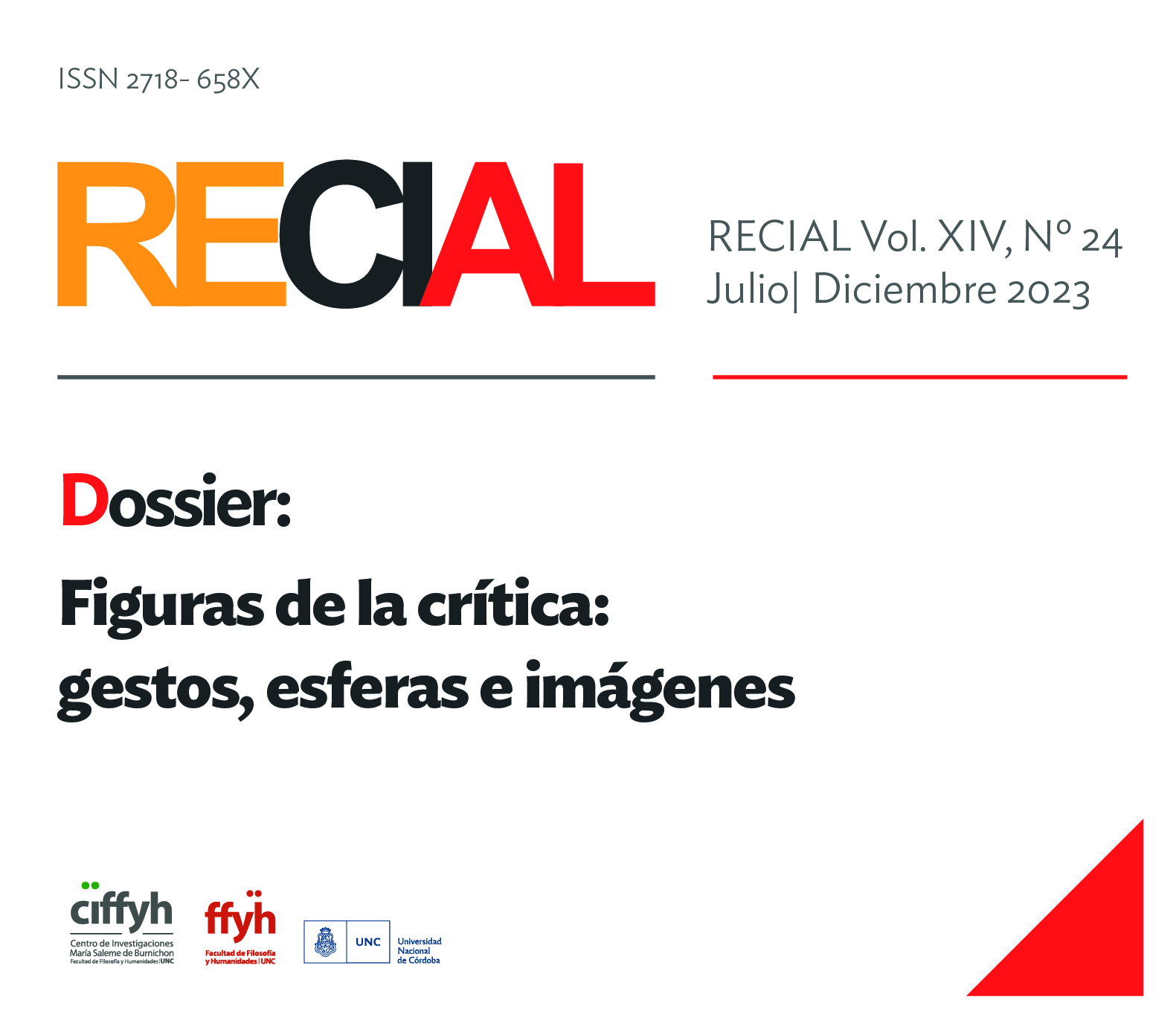Eschatology as revolt and counter-conduct in Michel Foucault
DOI:
https://doi.org/10.53971/2718.658x.v15.n24.43368Keywords:
Foucault, eschatology, counter-conduct, revolt, interruptionAbstract
This paper explores Foucault's reflections on eschatology in courses, articles and interviews produced in 1978 and 1979. The starting point is the course Security, territory, population, in particular the 1978 classes, which is put in dialogue with Foucault's articles and interviews on the Iranian revolution. The hypothesis proposed is that these texts are crossed by common interests and that, around their key concepts of counter-conduct, revolt and spirituality, there is a strong connection through the religious figure of eschatology. Despite the scarce precision of the concept of eschatology in Foucault, it is possible to delimit the main characteristics and the particular use that the French philosopher makes of this term, which he strips of specific religious determinations and gives it an ethical-political sense as an interruption of a historical continuity in relation to revolt and resistance.
Downloads
References
Abbès, M. (2016). Révolutions arabes et théologie politique. Astérion [En linea], 14. https://doi.org/10.4000/asterion.2697
Afary, J. y Anderson, K. (ed.). (2005). Foucault and the Iranian Revolution. Gender and the Seductions of Islamism. Chicago, Estados Unidos: University of Chicago Press.
Blengino, L. (2019). Foucault en Irán. Periodismo radical, viaje y heterotopía. La actitud ilustrada más allá del fin de la historia. Dorsal. Revista de Estudios Foucaultianos, 6, 11-27. Doi: 10.5281/zenodo.3245843.
Botticelli, S. (2019). Lo singular y lo universal: supuestos e implicancias de la moral antiestratégica foucaultiana. Dorsal. Revista de Estudios Foucaultianos, 6, 81-107. Doi: 10.5281/zenodo.3245865.
Catalina, C. (2017). Política escatológica y economía salvífica en el cristianismo medieval: evasiones en la genealogía foucaultiana de la gubernamentalidad. Res Publica. Revista de Historia de las Ideas Políticas, 20 (2), 207-225. https://doi.org/10.5209/RPUB.56466
Catalina, C. (2018). Pastorado, soberanía y salvación: un análisis del poder gubernativo y jurídico en el cristianismo medieval (siglos XI-XIII) [tesis doctoral]. https://eprints.ucm.es/id/eprint/47259/
Cavagnis, J. (2012). Michel Foucault et le soulèvement iranien de 1978: retour sur la notion de «spiritualité politique». Cahiers philosophiques, 130, 51-71. https://doi.org/10.3917/caph.130.0051
Cohn, N. (1981). En pos del milenio. Revolucionarios milenaristas y anarquistas místicos de la Edad Media. Madrid, España: Alianza Editorial.
Cooper, M. (2014). The Law of the House hold: Foucault, Neoliberalism, and the Iranian Revolution. En V. Lemm y M. Vatter (eds.), The Government of Life: Foucault, Biopolitics, and Neoliberalism (pp. 29-58). Nueva York, Estados Unidos: Fordham University Press.
Davidson, A. (2012). Elogio de la contraconducta. Revista de estudios sociales, 43, 152-164. http://dx.doi.org/10.7440/res43.2012.13
Foucault, M. (1994). Dits et écrits, III. París, Francia: Gallimard.
Foucault, M. (1995). ¿Qué es la crítica? (Crítica y Aufklärung). Daimon. Revista Internacional de Filosofía, 11, 5–25. https://revistas.um.es/daimon/article/view/7261
Foucault, M. (1999). ¿Es inútil sublevarse?. En Estética, ética y hermenéutica. Obras esenciales, Volumen III (pp. 203-209). Barcelona, España: Paidós.
Foucault, M. (2006). Seguridad, territorio y población. Ciudad Autónoma de Buenos Aires, Argentina: Fondo de Cultura Económica.
Foucault, M. (2010). El coraje de la verdad. Ciudad Autónoma de Buenos Aires, Argentina: Fondo de Cultura Económica.
Foucault, M. (2017). Sublevarse. Entrevista inédita con Farès Sassine. Viña del Mar, Chile: Catálogo Libros.
Foucault, M. (2018). Entretien avec Michel Foucault, L'OBS, nº 2779, 73-78. https://ecole-lacanienne.net/wp-content/uploads/2016/04/foucault-entretien.pdf
Ghamari-Tabrizi, B. (2009). When Life Will No Longer Barter Itself: In Defense of Foucault on the Iranian Revolution. En S. Binkley y Capetillo, J. (eds.), A Foucault for the 21st Century: Governmentality, Biopolitics and Discipline in the New Millennium (pp. 270-290). Cambridge, Reino Unido: Cambridge Scholars Publishing.
Ghamari-Tabrizi, B. (2016). Foucault in Iran. Islamic Revolution after the Enlightenment. Minneapolis, Estados Unidos: University of Minnesota Press.
Gray, J. (2008). Misa negra. La religión apocalíptica y la muerte de la utopía. Barcelona, España: Paidós.
Hamilton, S. (2018). Foucault’s End of History: The Temporality of Governmentality and its End in the Anthropocene. Millennium: Journal of International Studies, 46(3), 371–395. https://doi.org/10.1177/0305829818774892
McCall, C. (2013). Ambivalent Modernities: Foucault’s Iranian Writings Reconsidered. Foucault Studies, 15, 27-51. Doi: 10.22439/fs.v0i15.3989.
Raffin, M. (2021). Michel Foucault y la Revolución Iraní: reflexiones en torno de la sublevación, la resistencia y la política. Las Torres de Lucca, 10 (18), pp. 169-197. https://revistas.ucm.es/index.php/LTDL/article/view/74912
Rambeau, F. (2015). La política espiritual. Ciencia política, 10 (19), 167-192. https://doi.org/10.15446/cp.v10n19.52377
Senellart, M. (2013). Michel Foucault: une autre histoire du christianisme?. Bulletin du centre d’études médiévales d’Auxerre | BUCEMA [en línea], 3. https://doi.org/10.4000/cem.12872
Sferco, S. (2019). Foucault y la cuestión de la «voluntad» en la sublevación iraní. Dorsal. Revista de Estudios Foucaultianos, 6, 43-66. Doi: 10.5281/zenodo.3245853.
Stimilli, E. (2016). L’apocalyptique, entre théologie politique et gouvernementalité. Revue de l'histoire des religions, 1, pp. 83-100. https://doi.org/10.4000/rhr.8490.
Torres Apablaza, I. (2021). Modulación ethopolítica de la existencia: una arqueología de lo político y la vida ética en Michel Foucault. Las Torres de Lucca. Revista Internacional de Filosofía Política, 10 (18), 87-97. https://revistas.ucm.es/index.php/LTDL/article/view/74913
Zolles, C. (2020). History beyond the Ken: Towards a Critical Historiography of Apocalyptic Politics with Jacob Taubes and Michel Foucault. En V. Wieser et al. [eds.]. Cultures of Eschatology (pp. 783-815). De Gruyter. https://doi.org/10.1515/9783110597745
Published
How to Cite
Issue
Section
License

This work is licensed under a Creative Commons Attribution-NonCommercial-ShareAlike 4.0 International License.
Aquellos/as autores/as que tengan publicaciones en esta revista, aceptan los términos siguientes:
- Los/as autores/as conservarán sus derechos de autor y garantizarán a la revista el derecho de primera publicación de su obra, el cuál estará simultáneamente sujeto a la Licencia de reconocimiento de Creative Commons que permite a terceros compartir la obra siempre que se indique su autor y su primera publicación esta revista.
- Los/as autores/as podrán adoptar otros acuerdos de licencia no exclusiva de distribución de la versión de la obra publicada (p. ej.: depositarla en un archivo telemático institucional o publicarla en un volumen monográfico) siempre que se indique la publicación inicial en esta revista.
- Se permite y recomienda a los/as autores/as difundir su obra a través de Internet (p. ej.: en archivos telemáticos institucionales o en su página web), luego de su publicación en la revista. (Véase El efecto del acceso abierto).























